
According to legend, the water in the town of Eureka Springs, Arkansas, has healing properties for anyone who bathes in it. No wonder, then, that the town has become a spot for Christian pilgrims looking for spiritual renewal, or just a place to spend a vacation in the Ozarks. The city, noted for its outdoor Passion Play which recreates the ministry of Jesus, has become one of the few “Christian” tourist spots in North America.
But there’s another side to the town. Michael Palmieri and Donal Mosher discovered the city of Eureka Springs while making a short film about legal protections in the south. While filming, the pair uncovered the surprisingly active queer community, all centred around a gay bar called Eureka Live. Even more surprising, Mosher & Palmieri found that the fervent Christians and gay populace of Eureka Springs got along extremely well. Tempted by the notion that Eureka Springs could offer lessons in healing political rifts around the country, the two set out to make a film about the city, and its unique blending of the very Christian, and the very gay.
After lighting up the festival circuit in 2018, The Gospel of Eureka opened in select theatres February 8. A release on Blu-Ray, Amazon streaming and public television will happen later this spring.
Queerty caught up with Mosher & Palmieri to talk about the film and its lessons of unity.
How about we take this to the next level?
Our newsletter is like a refreshing cocktail (or mocktail) of LGBTQ+ entertainment and pop culture, served up with a side of eye-candy.
Congratulations on the movie. We’ve been hearing about it for a long, long time. And you guys landed a theatrical release.
MP: Today actually.
Awesome. So you discovered Eureka Springs while making a short film, right? And you discovered underground gay life?
MP: Well we actually were making a short film about a civil rights ordinance that was happening in the town around 2015. Friends of ours from Field of Vision asked us to go down there to cover it, and naturally, all these things were sort of in there because it was about basic civil protections. So we were originally covering the ordinance, but we discovered the Passion Play and this sort of community of Christians. Everyone there was Christian; half of them were LGBTQ and half were Evangelical. We thought that is way more interesting. And because of the limitations of the short form, we knew we were kind of making a short and a long thing from the beginning. So we just started making the film. To find the nuance we wanted, it took us another three years.
DM: And as far as Eureka Live and the queer nightlife there, we were filming all day, knew there was a gay bar and went to it ready to have a drink. There it was in all its splendor, and we knew it was part of the story.

That’s fantastic.
MP: The interesting thing is that we met Lee and met Walter [Lee Keating & Walter Burell, the owners] a little bit later, but they weren’t characters in the short film. We got to know them because they were hanging out at the bar, but after the short film, we sort of asked them, you know, “would you guys be interested in taking this a little deeper?” At by that point, they thought these guys are ok, let’s go for it.
So you actually met Lee and Walter in the bar?
DM: Oh yeah.
MP: Yeah they were there every night. It’s a great bar.
It looks like a lot of fun. So were Lee & Walter—or anyone else for that matter—reluctant to go on camera?
MP: No, no, no. Everyone in the film is interested in being on camera, and we were interested in developing relationships with people around town. You can’t fake these kinds of relationships. You know, it just takes time, and it takes time to figure out if certain people are right for what you’re looking for. But the town, as a whole, on both sides, are very lovely people. The Evangelical community with the Passion Play, they let us film there quite a lot. They actually let us get dressed up in the robes and the garb so we could get shots from the stage.

That’s so funny. I hope those are in the special features of the DVD.
DM: There are pictures.
MP: There are pictures floating around, yeah.
It’s interesting because Eureka Springs is religious, but it also strikes me as a show business town, which may be why everyone gets along so well. Everyone feels like they’re in showbusiness in one form or another.
DM: Definitely. I think the reason it’s kind of the haven that it is, is because everyone is putting on a show. The way we saw it—the Christian and the queer communities—were performing their identities for each other or for themselves. And beneath it, all is the tourist industry. At some point, it all boils down to, yes, showmanship and a little bit of monetary drive beneath it. And beneath that, the necessary arrangements that happen in a small town. Yes, you may be on opposite sides of the political fence, but you’re going to support each other’s businesses, you’re going to see each other in church or at the Passion Play. So there’s a certain amount of civility that comes with that.
MP: With the Passion Play though, it creates a lot of tourism for the town. So, you know, there is the kind of focus that it needs to happen for money to be rolling into town, though I don’t think that if the Passion Play disappears that the town disappears at this stage. It’s such a tourist destination spot—it’s so beautiful. The hotel industry is a really big driver there.
DM: But I’m sure also, there’s a little bit of dad takes mom and the kids to the Passion Play and to a good meal, and then after he goes for a drink by himself and where does he sneak off to?
[Laughter]
We don’t want to know. We don’t ask. But one thing, in discussing the film, one thing that continually strikes me as odd—and maybe this says more about me—people seem amazed that the drag queens in the bar perform country and gospel numbers, and perform them sincerely.
DM: Oh yeah, but it is shocking that, you know, that they would have that attitude. Nothing is sacred and everything is sacred where drag is concerned. So, of course, they’d perform gospel stuff.
Now with the queens you interviewed, did you discuss their spirituality? Are they people of faith.
DM: Yes.
MP: Oh yeah. They are. There was a bit of a shock. I’m not from the south, you know, and I feel like everyone from the south knows their Bible. But I was really surprised that every person we encountered was a believer in the different ways that they believed. Everyone has a different way of thinking about it.

On the surface, it might seem like there are contradictions in it in that in the popular consciousness queerness and Christianity cannot be compatible. After making this film, has that changed your views? What did you learn from these people who seem to be at ease with both?
DM: I mean, I grew up in North Carolina and that was the 80s, so the pressures I was under and the brutality of being gay in the south there, the emotional brutality of the church and the physical brutality of bigots—I had to leave. I took off. So what was remarkable to me about what Eureka does for people is that it allows them a place where they don’t have to make such dramatic shifts in their lives. They can just have a place where they feel safe, and they can redefine their spirituality as they fit. And you can kind of see that progression with Lee and Walter.
What about for you Michael?
MP: My religious views haven’t changed. I always say call me a “practical agnostic.” I was raised Catholic. But my personal opinion going into it was the same as going out of it, which is that religious systems are there to provide moral guidance. So I think for a lot of people that it’s very critical to have a place for their belief systems. I think it’s in To Kill a Mockingbird: “The Bible is a good book, but it is not the only book.” I always think of those things when I think about aligning myself with a religious belief. But at the same time, I don’t see anything wrong with it. I don’t see any conundrum with someone being a Christian; with someone being a Methodist or an Evangelical, or another person being Jewish or Muslim, anything. The systems are for personal guidance, and we see how people pervert it. That’s, to me, the thing that I’m always wary of. But again, in this film, evangelicals are actually quite surprising. As a gay man, I have to be honest, I do not agree with the positions that the evangelicals are taking against me, or against people in society. They can be extremists, but that’s not all of them. In this film, you had to work with the Golden Rule in terms of making this film and drawing these characters.

DM: Yeah. I’m not a believer, but I do believe in life’s poetic and symbolic systems. We have to investigate our own and investigate others. In my perfect world, there would not be organized religion, but that’s not going to happen. It’s here, it’s not going anywhere. Change is very slow in religion. So when we took this on, rather than attack religion, we said: “Let’s find what strength we can.” Every civil rights movement in the south is closely tied to religion. And churches have done a great deal of damage to people, but they’ve also given a great deal of strength.
You know the civil rights struggle at the center of this film—the transgender bathroom bill—is just bizarre. It’s strange that what everyone wants to focus on is where everyone is peeing.
MP: It’s the age-old wedge issue. It was a town ordinance. It’s actually confusing. Because the town knew that the state was trying to pass anti-trans legislation, they said “let’s get something on the books to protect and to defy” what would soon be removed from them. So they pass the civil rights bill, but then the state ended up passing something that negated it. So in order to challenge a state law, they wanted to have something on the books.
Related: Gay Christian Student Recalls Being Hazed And Tortured For Hours By 15 Of His Fellow Church Members
DM: Then at the point where they’d put in all this emotion, then outside Christian lobbying forces came in. There might not have been a fight in the town had outside Christian forces not started pumping money into the opposition. What happened there became the testing ground for what has been happening on much broader levels throughout the country.
And in that greater context, Eureka Springs was founded as a healing site. People went there because the waters had mystical properties. So having spent years on this project and gotten to know the people, Eureka seems like a place where everyone can get along, and where society has healed.
DM: I think because of proximity and performing in this place, there are a lot of big personalities and complicated identities in this little place. They’re forced to just look at each other with more complex eyes. Right now, media and our own political anger can prevent us from looking at other people as complex human beings. Hopefully, the film looks at the issue of faith in these individuals with a little more complexity.
MP: Yeah, the message is tolerance. It’s very easy to attack what you feel is wrong, and attack the groups that have historically always attacked your group. But honestly, the past couple of years, where has all the fighting gotten us? So it was kind of the rule of this film to try and be as open-hearted and honest as possible about people’s positions rather than just go the negative route.

So do the people of Eureka Springs feel it’s an accurate portrayal?
MP: Yeah.
DM: As often as they can, the cast members come with us [to screen the film]. Booker, the drag queens, yeah.
MP: On the Passion Play side, right now they’re in rehearsals, so they haven’t been able to join us on the festival tour. But Kent [Kent Butler, who performs the role of Jesus] actually teaches in Portland, and when he comes out and teaches. So we still hang out with him when he comes out to where we live. But the people of the town—we showed the short film, but we have yet to show the feature because of all the complexity in showing the film. But we did show it at Hot Springs, Arkansas as the film festival. And a lot of people came in for that. That was, for us, the real nail biter. And people really responded overwhelmingly positively. It won the Arkansas Documentary Award. That, we’re really proud of. As an outsider, you don’t want to misrepresent.
You want to capture the special feeling of experiencing it for the first time.
The Gospel of Eureka is now playing in select theatres. The film will open in Los Angeles on March 8.
A public television airing and release on Blu-Ray & Amazon streaming will follow this spring. The soundtrack, composed by Palmieri and Mosher, is available for free on Spotify.


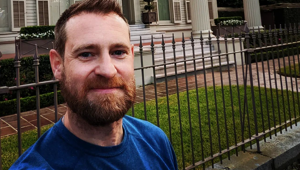
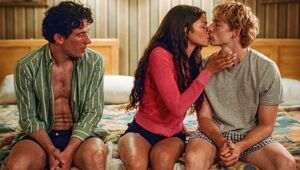




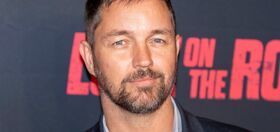



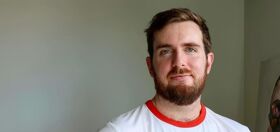

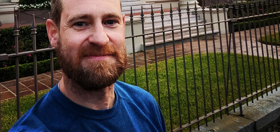

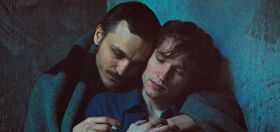


Thad
Eureka Springs has been special for a long time. My late friend Anita, who taught long ago at the University of Missouri, loved it,